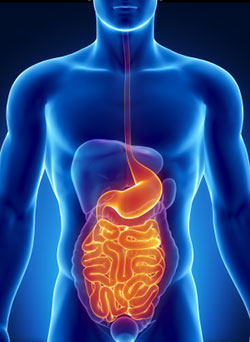
Digestive health is a very important aspect of your overall health. Your digestive habits will change based on your genetics, eating habits, exercise habits and age. Being informed about what digestive problems that can strike during certain periods in your life can allow you to make healthy choices to prevent them.
There are simple steps that you can take in order to help maintain your digestive health. When eating, slow down! Chewing your food fully allows you to avoid swallowing air that leads to excessive gas and bloating. Eating smaller nutritious meals full of protein, fibre, fruits and vegetables can also contribute to a healthy digestive system. If you eat a large portion in one sitting you put stress on your lower esophageal sphincter. This muscle is responsible for keeping food moving back up your esophageal which causes heartburn. Fibre is also very important in keeping your digestive rhythm in order. Fibre comes in two different forms; insoluble fibre and soluble fibre. Insoluble fibre is found in nuts and seeds. It helps to prevent constipation by bulking up your stool. Soluble fibre is found in vegetables, fruits and whole grains, It is a binding agent that helps to reduce cholesterol. Psyllium fibre products can be taken if you find it difficult to get your daily fibre intake. Eating frequent smaller meals will help to regulate your blood sugars and metabolism. Another way to ensure your digestive health it to stay upright after a meal. Many people may feel tired after a large meal and want to lay down, but one should stay upright for at least three hours in order to let gravity do its job to move the food down your stomach and intestines. Certain foods and drinks can act as triggers in upsetting your stomach. Common triggers for indigestion include greasy foods, caffeine, spicy foods and chocolate. To limit stomach uncomfort limit your intake of these foods, or use an over-the-counter product to help alleviate your symptoms. Alcohol and cigarettes are also stomach irritants and limiting or avoiding them all together can help foster a healthy digestive tract. Another way to become more regular and support healthy digestion is to exercise. Movement helps to encourage food to more through the body thus preventing constipation.
Probiotics
The World Health Organization defined probiotics in 2001 as "live micro-organisms which, when administered in adequate amounts, confer a health benefit on the host". The most common types of probiotics that are seen these days are various yogurts, or other fermented dairy products. For many people with digestive problems like Irritable Bowel Syndrome, probiotics can make a significant difference in quality of life. Probiotics can also be used to treat other conditions like lactose intolerance, or even blood pressure. However, many of the claims of probiotics' health benefits have been dismissed by the European Food Safety Authority, so make sure to consult with a medical professional before pursuing probiotics as a course of treatment.
Common Digestive Problems
Constipation
Constipation refers to bowel movements that are infrequent or difficult to pass. Constipation is common in the general population. It is a common cause of painful stools and can become severe. Constipation refers to infrequent bowel movements (less than three movements per week), difficulty passing stools, and the feeling of incomplete bowel evacuation. Severe constipation includes bowel obstructions and failure to pass gas or stools. Constipation is a symptom not a disease so it is important to keep track of your bowel movements or seek medical advice if you feel that you may be severely constipated. There are many different causes of constipation including inadequate fibre intake, poor diet, side effects of medication, not drinking enough fluids and decreased physical activity. There are many different treatments for constipation including increasing one’s exercise level, fibre intake, changing one’s diet. If these simple steps do not relieve your constipation, over the counter laxatives and enemas may provide relief. If your constipation is severe or persistent make an appointment with your doctor to find the root cause of your constipation and to create a treatment plan.
Irritable bowel syndrome
Irritable bowel syndrome is diagnosed through the symptoms by chronic abdominal pain, bloating and alteration of typically normal bowel habits. Irritable bowel syndrome has no organic cause and is usually diagnosed based on symptoms alone. Common symptoms of irritable bowel symptoms are diarrhea or constipation. There may also be abdominal pain, bloating and a feeling of incomplete bowel movements. There is currently no cure for IBS, but there are treatments that help to relieve symptoms including changes in diet and medications. Patient education is also important for those with irritable bowel syndrome because it can provide information about potential triggers. If you believe you may be suffering from irritable bowel syndrome contact your local health care provider to find a treatment plan for you.